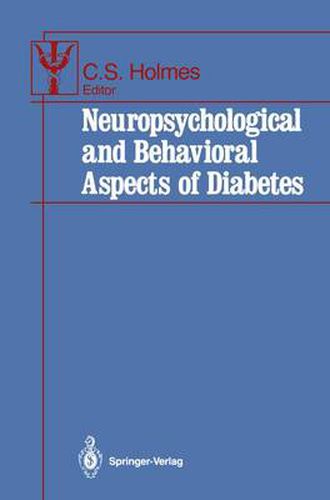Readings Newsletter
Become a Readings Member to make your shopping experience even easier.
Sign in or sign up for free!
You’re not far away from qualifying for FREE standard shipping within Australia
You’ve qualified for FREE standard shipping within Australia
The cart is loading…






This title is printed to order. This book may have been self-published. If so, we cannot guarantee the quality of the content. In the main most books will have gone through the editing process however some may not. We therefore suggest that you be aware of this before ordering this book. If in doubt check either the author or publisher’s details as we are unable to accept any returns unless they are faulty. Please contact us if you have any questions.
Behavioral medicine has blossomed as an area of systematic investiga tion during the past 10-20 years. Throughout its steady growth, there have been increasing interest and specialization in the study of neuro psychological and behavioral aspects of diabetes. This book attempts to capture and report exciting new developments in the study of both insulin-dependent (Type I) and non-insulin-dependent (Type II) dia betes mellitus. Accordingly, it is divided into two major sections. Physiological aspects of each disease, which differ significantly in pathophysiology and course, are discussed in separate medical over views that introduce each major section. These overviews are written by Drs. Tsalikian and Zimmerman, leading medical researchers in insulin and non-insulin-dependent diabetes, respectively. Each section also contains chapters describing neuropsychological and cognitive disease correlates, psychosocial patterns of adjustment, and treatment adher ence issues. Psychological aspects of insulin-dependent diabetes have been studied more extensively than non-insulin-dependent diabetes, perhaps because it is more often associated with graver medical compli cations. Therefore, there is a larger body of research to review and the first section has been divided into chapters on cognitive disease se quelae in populations of children and adults, separately. In his chapter, Dr. Ryan discusses developmental factors related to the unique sensi tivity of the brain to metabolic derangement. Dr. Holmes reviews studies of adults with diabetes and the cognitive correlates of both acute and chronic blood glucose disruption. Developmental disease is sues are further covered in Dr.
$9.00 standard shipping within Australia
FREE standard shipping within Australia for orders over $100.00
Express & International shipping calculated at checkout
This title is printed to order. This book may have been self-published. If so, we cannot guarantee the quality of the content. In the main most books will have gone through the editing process however some may not. We therefore suggest that you be aware of this before ordering this book. If in doubt check either the author or publisher’s details as we are unable to accept any returns unless they are faulty. Please contact us if you have any questions.
Behavioral medicine has blossomed as an area of systematic investiga tion during the past 10-20 years. Throughout its steady growth, there have been increasing interest and specialization in the study of neuro psychological and behavioral aspects of diabetes. This book attempts to capture and report exciting new developments in the study of both insulin-dependent (Type I) and non-insulin-dependent (Type II) dia betes mellitus. Accordingly, it is divided into two major sections. Physiological aspects of each disease, which differ significantly in pathophysiology and course, are discussed in separate medical over views that introduce each major section. These overviews are written by Drs. Tsalikian and Zimmerman, leading medical researchers in insulin and non-insulin-dependent diabetes, respectively. Each section also contains chapters describing neuropsychological and cognitive disease correlates, psychosocial patterns of adjustment, and treatment adher ence issues. Psychological aspects of insulin-dependent diabetes have been studied more extensively than non-insulin-dependent diabetes, perhaps because it is more often associated with graver medical compli cations. Therefore, there is a larger body of research to review and the first section has been divided into chapters on cognitive disease se quelae in populations of children and adults, separately. In his chapter, Dr. Ryan discusses developmental factors related to the unique sensi tivity of the brain to metabolic derangement. Dr. Holmes reviews studies of adults with diabetes and the cognitive correlates of both acute and chronic blood glucose disruption. Developmental disease is sues are further covered in Dr.